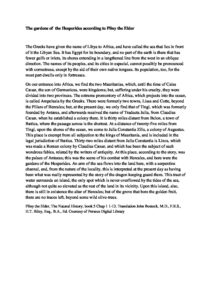The Greeks have given the name of Libya to Africa, and have called the sea that lies in front of it the Libyan Sea. It has Egypt for its boundary, and no part of the earth is there that has fewer gulfs or inlets, its shores extending in a lengthened line from the west in an oblique direction. The names of its peoples, and its cities in especial, cannot possibly be pronounced with correctness, except by the aid of their own native tongues. Its population, too, for the most part dwells only in fortresses.
On our entrance into Africa, we find the two Mauritanias, which, until the time of Caius Cæsar, the son of Germanicus, were kingdoms; but, suffering under his cruelty, they were divided into two provinces. The extreme promontory of Africa, which projects into the ocean, is called Ampelusia by the Greeks. There were formerly two towns, Lissa and Cotte, beyond the Pillars of Hercules; but, at the present day, we only find that of Tingi, which was formerly founded by Antæus, and afterwards received the name of Traducta Julia, from Claudius Cæsar, when he established a colony there. It is thirty miles distant from Belon, a town of Bætica, where the passage across is the shortest. At a distance of twenty-five miles from Tingi, upon the shores of the ocean, we come to Julia Constantia Zilis, a colony of Augustus. This place is exempt from all subjection to the kings of Mauritania, and is included in the legal jurisdiction of Bætica. Thirty-two miles distant from Julia Constantia is Lixos, which was made a Roman colony by Claudius Cæsar, and which has been the subject of such wondrous fables, related by the writers of antiquity. At this place, according to the story, was the palace of Antaeus; this was the scene of his combat with Hercules, and here were the gardens of the Hesperides. An arm of the sea flows into the land here, with a serpentine channel, and, from the nature of the locality, this is interpreted at the present day as having been what was really represented by the story of the dragon keeping guard there. This tract of water surrounds an island, the only spot which is never overflowed by the tides of the sea, although not quite so elevated as the rest of the land in its vicinity. Upon this island, also, there is still in existence the altar of Hercules; but of the grove that bore the golden fruit, there are no traces left, beyond some wild olive-trees.
